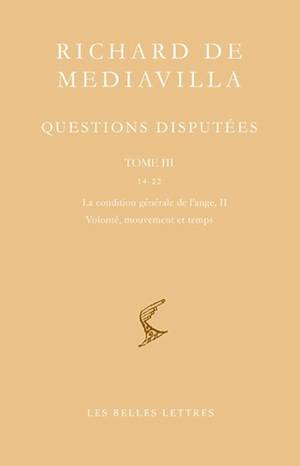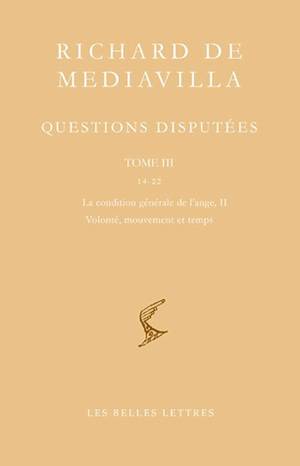
- Afhalen na 1 uur in een winkel met voorraad
- Gratis thuislevering in België vanaf € 30
- Ruim aanbod met 7 miljoen producten
- Afhalen na 1 uur in een winkel met voorraad
- Gratis thuislevering in België vanaf € 30
- Ruim aanbod met 7 miljoen producten
Zoeken
Questions 14-22
la condition générale de l'ange II, volonté, mouvement et temps
Richard de Mediavilla
€ 57,00
+ 114 punten
Omschrijving
English summary: Richard of Middleton, a Franciscan living and working around the end of the 13th century, was a very important and profoundly original thinker. The Bibliotheque Scolastique series publishes, in 6 volumes, his unedited Quaestiones disputatae. Volume III deals with the questions concerning the free will of angels and humans. French description: Richard de Mediavilla, franciscain actif a la fin du XIIIe siecle, est un penseur scolastique fort important et profondement original. La Bibliotheque Scolastique publie en 6 tomes ses 45 questions disputees inedites (decennie 1290). Les tomes I, II et IV ont deja paru en 2011 et 2012. Ce volume est central, car, au terme d'une analyse serree, Mediavilla exalte particulierement la volonte de l'ange (et de l'homme), theme essentiel a l'identite de la theologie franciscaine, mais rarement theorise. L'orientation naturaliste et scientifique de sa demarche est encore plus nette, appuyee cette fois surtout sur Averroes. On verra, dans la question 16, que Mediavilla, bien avant Copernic, Kepler et Galilee, prouve la rotation terrestre autour du soleil et instaure un systeme d'attraction universelle. Il est le premier a revoir totalement la theorie du mouvement d'Aristote. Dans les questions 17 et 19, il elabore completement son fameux Principe Purement Possible et s'affirme comme un metaphysicien de premiere importance.
Specificaties
Betrokkenen
- Auteur(s):
- Uitgeverij:
Inhoud
- Aantal bladzijden:
- 462
- Taal:
- Frans
- Reeks:
- Reeksnummer:
- nr. 3
Eigenschappen
- Productcode (EAN):
- 9782251610061
- Verschijningsdatum:
- 24/01/2013
- Uitvoering:
- Paperback
- Formaat:
- Trade paperback (VS)
- Afmetingen:
- 130 mm x 200 mm
- Gewicht:
- 530 g

Alleen bij Standaard Boekhandel
+ 114 punten op je klantenkaart van Standaard Boekhandel
Beoordelingen
We publiceren alleen reviews die voldoen aan de voorwaarden voor reviews. Bekijk onze voorwaarden voor reviews.











